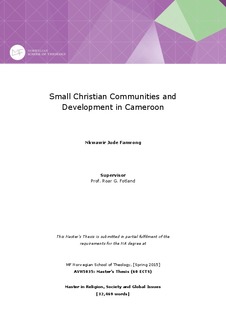| dc.description.abstract | The aim of my study was to answer the research question and sub questions, in other
words, to find out the relationship between Small Christian Communities ( SCCs) and
development; their vision of development, as a mission of the church or a secular task?
According to SCCs, the mission of the church is to impact faith, to evangelize the people, to
proclaim the Word of God or to make Him known, to bring peace and salvation, to help the
poor and to practice charity. Her most important mission is to dispense peace, love, unity and
salvation. However, this does not exclude her from engaging in development work and
practice. Cases abound where the Church is involved in developmental issues: poverty
alleviation, health care services, education, and provision of clean portable water.
Contrary to some assumptions, mindsets, practices and views, therefore, development
is an essential aspect of the mission of the Church. This is rooted in the mission of Christ
which was characterized by the concern he showed to those who were suffering.
Consequently, as John Paul II has said, “ It is impossible to accept that in evangelization one
could or should ignore the importance of the problems so much discussed today, concerning
justice, liberation, development and peace in the world” (John Paul II, 1995, Ecclesia in
Africa, paragraph 68). Because of human dignity, people should not live in sub-human social,
economic, cultural and political conditions. In her evangelizing mission, therefore, the Church
should defend human dignity; strive for justice and peace, for the promotion, liberation, and
integral human development of all individual human beings (John Paul II, 1995, Ecclesia in
Africa, paragraph 69).
On the strength of this evidence, my conclusion is that the church has something to do
with development: it is her mission to be involved in developmental issues.
From the activities of SCCs and the answers to the interview questions, it is evident that there
is a relationship between the perspective of SCCs and the secular perspective on development.
It is a relationship of similarities and dissimilarities.
On the one hand, since the SCCs recognize the importance of human dignity, respect for
human rights, and the need for participation, their perspective on development is similar to the
human development paradigm which includes the basic needs, capabilities and freedomcentered
and enlarging people’s choices approaches.
The basic needs approach sees development as a moral imperative aimed at satisfying
the basic needs of human beings such as food, shelter, access to clean drinking water, health
care, sanitation, education, and to participate in decision-making processes. The human
development approach also envisages development as a process of expanding people’s capabilities and freedom. In this sense, the end of development is to give people the
opportunities to reach their human potentials, that is, to be educated, to be healthy, to
participate in the life of the community, to engage in relationships, to live in a peaceful
environment, and to enjoy nature.
Another commonality lies in the area of sustainable development (gender-centered and
environmental approaches). SCCs are concerned with social justice in the form of poverty
alleviation and gender equality and women empowerment as evident from the activities of the
women’s affairs commission. They also affirm the importance of environmental
sustainability. In this sense, SCCs bear some similarity with the conventional perspective on
development.
On the other hand, there are some fundamental differences from the point of view of
the anthropological vision of a human being, and the aim of development.For the SCCs, the
human being is a composite of body and soul, created to live in communion with other human
beings and with God; he/she finds ultimate fulfillment in God. This conception of the human
person introduces a more integral or holistic vision of human development, what is commonly
referred to as integral human development. Since human development is integral and is open
to the transcendental or spiritual aspect of life, the end of human progress is eternal life.
Without this dimension, economic and material development is insufficient to bring about
genuine development. | nb_NO |
